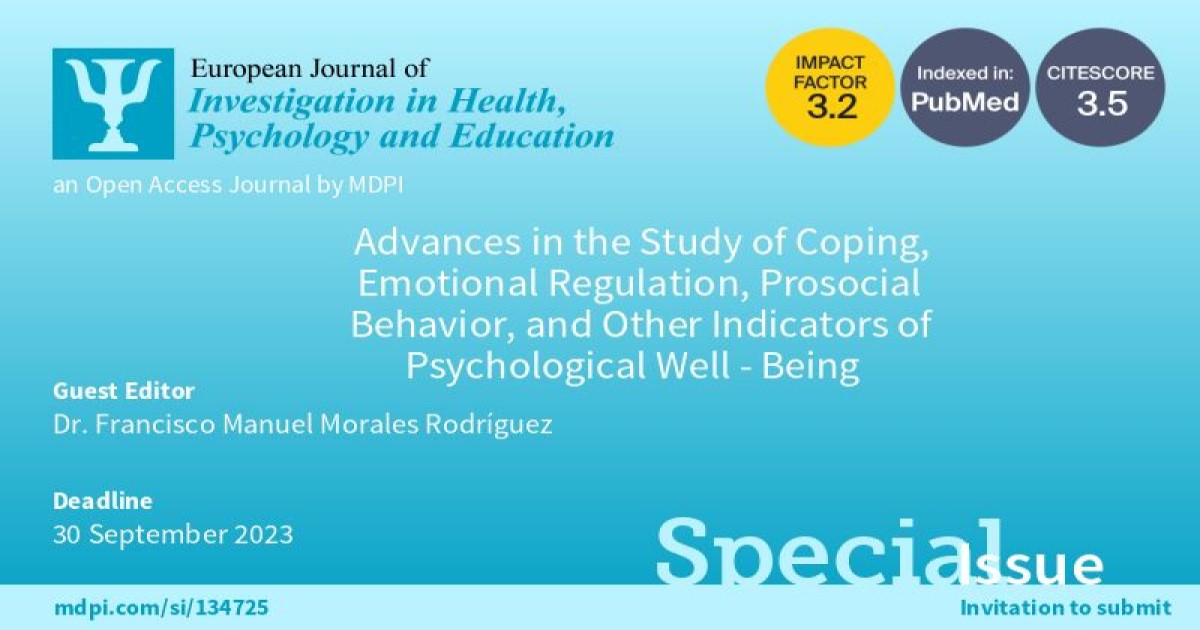Advances in the Study of Coping, Emotional Regulation, Prosocial Behavior, and Other Indicators of Psychological Well-Being
A special issue of European Journal of Investigation in Health, Psychology and Education (ISSN 2254-9625).
Deadline for manuscript submissions: closed (30 September 2023) | Viewed by 75669

Special Issue Editor
Interests: educational psychology; coping strategies; daily stress; academic engagement; generic competences; affective–sexual diversity; prosocial behaviour; social skill
Special Issues, Collections and Topics in MDPI journals
Special Issue Information
Dear Colleagues,
Prosocial behaviors are closely related to other skills and behaviors, such as coping strategies. The use of productive and effective coping strategies when faced with issues such as school coexistence and deteriorating interpersonal relationships, which are currently occurring at a high rate in educational centers, is associated with more favorable results such as socio-emotional adaptation, a greater degree of overall/general adaptation, empathy, prosocial behavior, and psychological well-being.
The relationship between personal psychological factors such as well-being, prosociality, the emotional dimension (either in its positive aspects, such as empathy and emotional regulation, or in its negative aspects, such as depression and anxiety), and the use of coping strategies must be addressed. Coping strategies, emotional regulation, and prosocial behavior are relevant variables for the design of psychoeducational intervention programs that promote effective coping strategies education in different contexts for adequate emotional adjustment, as well as to avoid aggression and violence. Research has also demonstrated the importance of prosocial behavior and the practical use of coping strategies in terms of promoting academic achievement.
This Special Issue invites you to submit empirical research or review articles on emotion-focused coping and its relationship with prosocial behavior, quality of life, and psychological well-being at different developmental stages. Articles that more generally address coping with daily stress, emotional regulation, education and promotion of empathy, and the development of prosocial behavior and solidarity actions in different educational, social, professional, and health-related contexts, are also encouraged.
Dr. Francisco Manuel Morales Rodríguez
Guest Editor
Manuscript Submission Information
Manuscripts should be submitted online at www.mdpi.com by registering and logging in to this website. Once you are registered, click here to go to the submission form. Manuscripts can be submitted until the deadline. All submissions that pass pre-check are peer-reviewed. Accepted papers will be published continuously in the journal (as soon as accepted) and will be listed together on the special issue website. Research articles, review articles as well as short communications are invited. For planned papers, a title and short abstract (about 100 words) can be sent to the Editorial Office for announcement on this website.
Submitted manuscripts should not have been published previously, nor be under consideration for publication elsewhere (except conference proceedings papers). All manuscripts are thoroughly refereed through a single-blind peer-review process. A guide for authors and other relevant information for submission of manuscripts is available on the Instructions for Authors page. European Journal of Investigation in Health, Psychology and Education is an international peer-reviewed open access monthly journal published by MDPI.
Please visit the Instructions for Authors page before submitting a manuscript. The Article Processing Charge (APC) for publication in this open access journal is 1600 CHF (Swiss Francs). Submitted papers should be well formatted and use good English. Authors may use MDPI's English editing service prior to publication or during author revisions.
Keywords
- coping
- emotional regulation
- program intervention
- prosocial behavior
- well-being
- empathy
- solidarity
Benefits of Publishing in a Special Issue
- Ease of navigation: Grouping papers by topic helps scholars navigate broad scope journals more efficiently.
- Greater discoverability: Special Issues support the reach and impact of scientific research. Articles in Special Issues are more discoverable and cited more frequently.
- Expansion of research network: Special Issues facilitate connections among authors, fostering scientific collaborations.
- External promotion: Articles in Special Issues are often promoted through the journal's social media, increasing their visibility.
- Reprint: MDPI Books provides the opportunity to republish successful Special Issues in book format, both online and in print.
Further information on MDPI's Special Issue policies can be found here.






